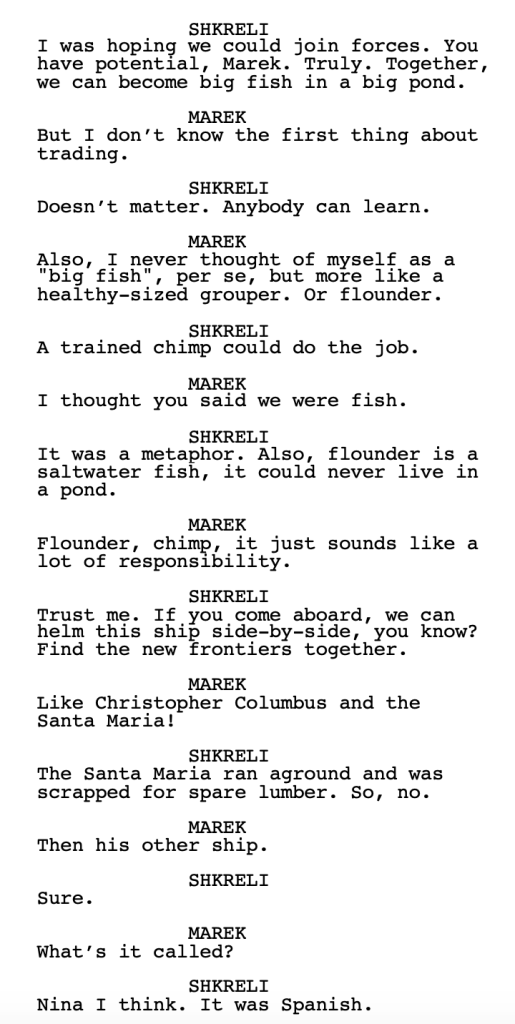Today’s script is Joker meets The Social Network meets The Wolf of Wall Street
Genre: Biopic
Premise: The completely outrageous and completely true story of “pharma bro” Martin Shkreli — from his meteoric rise as wunderkind hedge fund manager and pharmaceutical executive to his devastating fall involving crime, corruption and the Wu-Tang Clan — which exposed the rotten core of the American healthcare system.
About: This script finished in the top 5 of the recently released Black List, a list that tabulates development execs’ favorite scripts of the year. The script was written by Andrew Ferguson. Andrew had one script he put up on the Black List amateur site a couple of years ago that readers of that site enjoyed called Boost. The logline for that was: “Two safecracking sisters are recruited for a heist by the Corsican Mafia in order to establish a modern-day French Connection.”
Writer: Andrew Ferguson.
Details: 120 pages
You may be wondering why, of all the scripts on the new Black List, I’m reviewing a biopic. The answer to that question is the same answer to the question of, “What makes a good biopic?” A lot of writers get this wrong so I want you to pay attention. Biopic writers believe that what makes a good biopic subject is a famous person they like. That’s the only criteria they use. But today’s writer knows the correct answer to this question, which is, “Write about the most interesting person you can find.”
Because remember – biopics are inherently boring. They just are. They’re meat and potatoes bland narratives that take us through years and years of a person’s life, making it hard to jumpstart any sort of compelling story. Out of the gate, the plots’s a dud. The only chance you have of keeping readers invested is if the character is one of those “can’t look away from” characters. And today’s character is that.
Our narrator for this story is RZA, one of the members of The Wu-Tang Clan. RZA is coming to meet Martin in prison. But, before we can learn what he needs from Martin, he tells us all about Martin’s story.
We meet Martin Shkreli as a 12 year old kid whose Albanian father is a janitor. Martin is embarrassed by his father’s job. But he’s even more embarrassed by the fact that his father has no desire to improve his life. In Martin’s eyes, that’s the ultimate sin.
Martin wants to be rich so, straight out of high school, he cons his way into an interview with Jim Cramer – yes, the wacky financial host – back when he was running a billion dollar hedge fund. After convincing Cramer to hire him, Martin learns the value of “shorting,” which is when you invest money in the hopes of a company failing. This teaches Martin that there is heaps of money to be made by taking a morally irresponsible approach to investment.
Martin eventually quits Cramer’s fund and starts his own fund in his mid-20s. Naturally, it fails, so he starts another one, and that fails too. Despite losing tens of millions of dollars of his clients’ money, Martin identifies a market that nobody is capitalizing on: You can buy the rights to a pill then raise the price of that pill to whatever you want.
So that’s what Martin does. He buys a pill called Thiola and ups the price from 15 dollars to 350 dollars. It is of no consequence to Martin that the pill saves lives and that, by raising the price, many people will die. Journalists ask him if he cares about this and he literally says no, he does not. All he cares about is profit.
What Martin doesn’t plan for is for his story to go viral. It even hits the late night talk show circuit, with Stephen Colbert and Seth Myers going after him. Martin, who operates under the m.o. of any publicity is good publicity, eats the attention up, even doubling down on social media.
But it ends up getting so much publicity that the SEC starts looking into him. What they find is someone with such an atrocious moral compass that they’re positive he has skeletons in his closet. They turn out to be right, identifying numerous laws he’s broken in his decade in the financial industry. So they arrest him and send him off to prison, where Martin is residing until next year, when he will be released and surely begin another sketchy company.
The Villain is an inherently challenging script to write in that the hero is the worst human being ever. Ferguson seems to know this and attacks it immediately. Martin’s father is a poor immigrant. Martin has no friends. Nobody gives Martin a chance. Martin gets accepted into multiple Ivy League schools but can’t go because he can’t afford it.
I think Ferguson realized that this guy was going to do such despicable things later on that he had to drum up as much sympathy for him as possible. Keep us around long enough to where we realize how weird and interesting this guy is. And then, by that point, even though he’s become a grade-A dickoholic, we’re so fascinated by the guy that we have to keep reading.
The script is also good by general biopic terms. I grade on a negative curve when it comes to biopics since I hate them but this is definitely one of the better ones I’ve read. I loved the choice of using RZA as a narrator. You’re always looking for ways to contrast and clash elements in a screenplay. That’s where you create excitement – combining things that don’t typically combine.
RZA’s streetwise no-B.S. narration (“But we first gotta run it back to the beginning. ‘Cause in the beginning was the word. I’m talking about the one place every rags to riches story in America begins — motherfuckin’ Brooklyn!”) was the perfect accomplice for a story about white collar Wall Street.
The dialogue is also good. It’s not quite Sorkin. But you get gems like this one where Cramer responds to Martin’s handshake (“Jesus, kid. You got the handshake of a teenage girl with polio.”) as well the below exchange, which I chuckled at.
But I think that the main reason the script works is that it gets your emotions going. That’s all you’re really trying to do with a script – connect with the audience on an emotional level. If you don’t achieve that, the audience will forget your movie within a week. If you do achieve it, they’ll remember your movie for a lifetime. Those are the stakes you’re playing with when it comes to emotional connection.
You can do this through love, like Titanic. You can do it through fear, like The Exorcist. You can do it through sadness, like Million Dollar Baby. Or you can do it through anger. And while anger is the least effective version of creating an emotional connection (since it’s a negative emotion) it still works.
We get so enraged when Martin price-gouges these people who will die if they can’t afford his pill that we’re now emotionally invested in the story. We want a resolution. We need to find out that someone’s going to come in and save these people from this insane man.
On top of that, there was something refreshing about a character who has zero interest in redeeming himself. Martin not only accepts his villain label, he goes out of his way to flaunt it. This guy is the embodiment of evil and I think that’s why the internet became so fascinated by him. Most people back down when they’re called out. He doubled-down. So we were kind of thrown into uncharted waters. If this guy has no desire to change, where does the story go? I wanted to know.
The one issue I had with the script was that it was a bit try-hard. It wants to be the next Social Network. It wants to be the next Wolf of Wall Street or The Big Short. But you can feel the writer pushing for that cool-factor (“Shkreli inhales breadsticks as he sits opposite Adele and SEC Officer inside the tourist-infested Olive Garden, surrounded at every turn by MAMMOTH MIDWESTERN MOUTHBREATHERS with their OVOID OFFSPRING devouring discount Italian by the dinnerplate”) and I’m not a fan of when I can feel the author’s presence. I want to be lost in the story. I don’t want the writer to remind me that he’s there.
With that said, this was pretty good. Definitely worth checking out if you’re also a biopic writer.
[ ] What the hell did I just read?
[ ] wasn’t for me
[x] worth the read
[ ] impressive
[ ] genius
What I learned: When it comes to narrators, writers tend to use the most obvious choice. Instead, consider the least obvious choice, like RZA here. I guarantee it will be more interesting.




